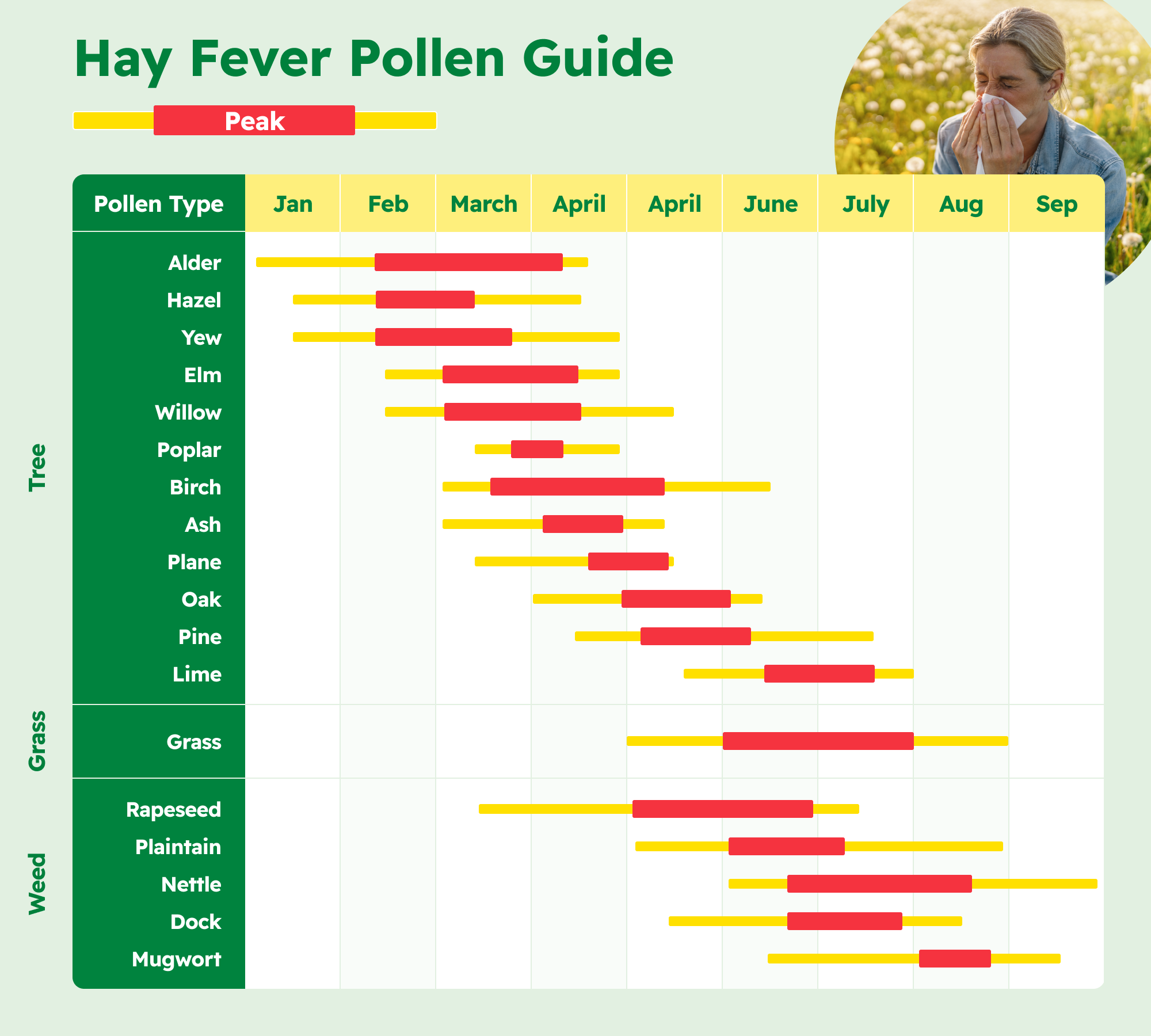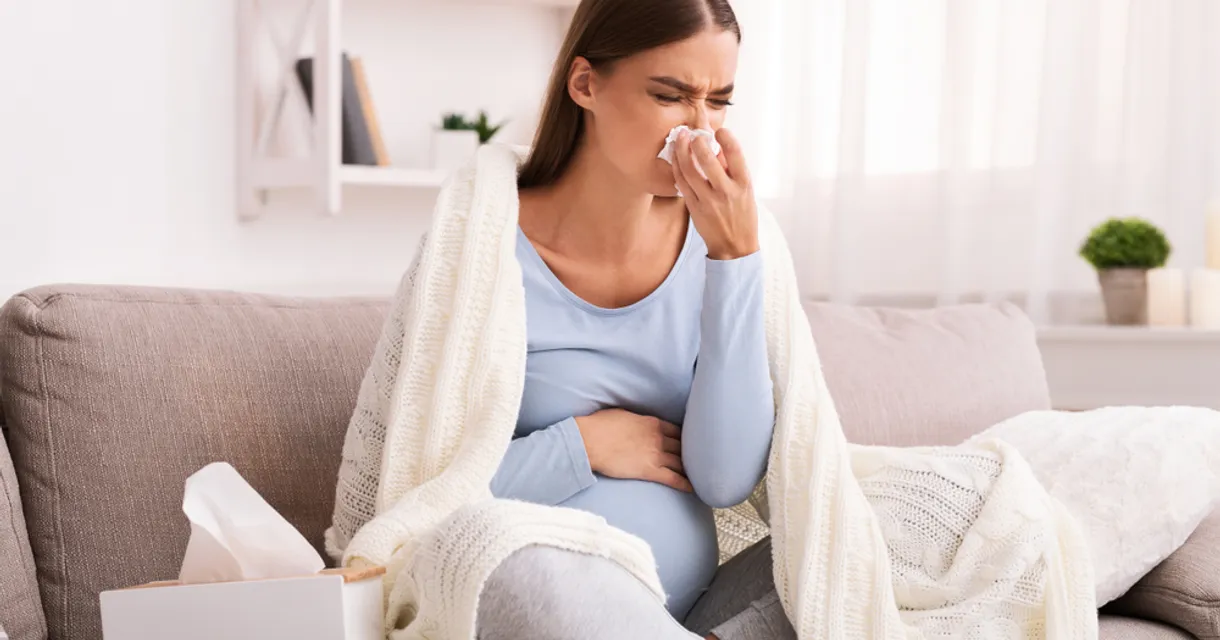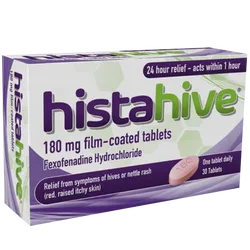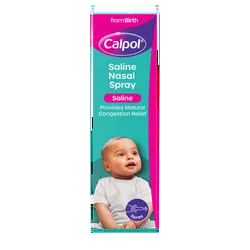Whether this is your first time experiencing hayfever in pregnancy or your symptoms have worsened since becoming pregnant, this guide has been created by expert doctors and pharmacists here at Weldricks to ensure you get the safe hayfever relief you need.
From understanding common symptoms to exploring pregnancy-safe treatments and natural remedies, this expertly curated guide covers everything you need to manage hayfever confidently during pregnancy.
Hayfever and Pregnancy: Key Facts
- Hayfever symptoms may feel more intense during pregnancy.
- If you're pregnant during high pollen months (March to September), you're more likely to notice stronger reactions.
- Pregnancy-safe treatments are available. Pregnancy-safe antihistamines like loratadine and cetirizine, as well as nasal sprays (e.g. beclometasone) and eye drops (e.g. sodium cromoglicate), are considered safe.
- Always consult a healthcare professional. Before starting any treatment, natural or medicinal, speak to your GP, pharmacist, midwife or a qualified online doctor.
Symptoms of Hayfever in Pregnancy
If you're pregnant and suffer from hayfever, your symptoms are likely to remain similar to those experienced outside of pregnancy. Similar to a cold or flu, symptoms such as a runny or blocked nose, sneezing, coughing, itchy or watery eyes, headaches and fatigue are all common hayfever symptoms which you’re likely to experience.
However, if you’re pregnant and have hayfever, you may find that you become more sensitive to pollen throughout your pregnancy, which can cause disturbed sleep and intensified symptoms. Understanding how hayfever affects you during pregnancy can help you manage your symptoms more effectively, and get the right treatment for your needs.
Hayfever during pregnancy can be frustrating, as your body is already experiencing significant changes, and added allergy symptoms can make things even more uncomfortable. If you're pregnant between March and September and suffer from seasonal allergies, you're more likely to notice these hayfever symptoms, especially when pollen levels are at their peak.
It’s also important to remember that you may be allergic to multiple types of pollen. Use our tree, grass and weed pollen calendar to identify which specific types of pollen are most likely triggering your symptoms, so you can better manage your hayfever throughout pregnancy.

Hayfever Relief When Pregnant
If you're looking for safe and effective ways to manage hayfever during pregnancy, our expert team is here to help. There are several pregnancy-safe options to consider, including avoiding common hayfever triggers, natural remedies and using pregnancy-safe antihistamines. Read our expert-backed advice so you can feel more comfortable being pregnant throughout allergy season.
Get the Right Hayfever Medication to Take During Pregnancy
From pregnancy-safe antihistamines to targeted nasal sprays, there are several options to help manage your symptoms safely.
- Antihistamines in pregnancy: For managing hay fever during pregnancy, antihistamines like loratadine (non-drowsy) and cetirizine are generally considered safe and effective. Both loratadine or cetirizine are also typically recommended while breastfeeding, too. If you are pregnant and unsure what hayfever treatments are safe to use, you should always discuss this with your doctor. A good guide to medicines can be found at BUMPS website
Additionally, Piriton including chlorphenamine can be used in pregnancy. The NHS reports there is no good evidence that it is harmful to your baby, but it can have side effects such as feeling drowsy which you may wish to avoid.
You can read our guide to choosing the best antihistamine for dosage, side effects, effectiveness and more on the best hayfever tablets.
- Nasal sprays for pregnancy: Nasal sprays are an effective, fast-working hayfever remedy. Nasal sprays such as beclometasone nasal spray are safe to use during pregnancy but you must consult your doctor before using Beconase Hayfever if you are pregnant. Very little of the medicine gets into your bloodstream and almost none gets to your baby.
- Eye drops: If you suffer with itchy, watery or sore eyes during hayfever, products such as Opticrom hayfever eye drops are designed to specifically target the eye area to provide relief from the discomfort of your symptoms. You can use sodium cromoglicate eye drops during pregnancy if you need them, as very little of the medicine gets into your bloodstream and it’s not thought to be harmful to your baby. Find out more about how sodium cromoglicate eye drops can affect you and your baby during pregnancy, on the Best Use of Medicines in Pregnancy (BUMPS) website.
Always speak to a GP, online doctor or midwife before trying new remedies to ensure they’re suitable for your pregnancy.
If you're pregnant and have other children, or if you're concerned your baby may be showing signs of hayfever, head over to our dedicated guide on hayfever and allergies in children and babies for everything you need to know.
SHOP ALLERGY AND HAYFEVER TABLETS
Natural Remedies for Hayfever Treatment in Pregnancy
If you’d prefer to go down the natural route during your pregnancy, you can try to avoid hayfever triggers or use natural remedies. Here are several ways to reduce your exposure to allergens and ease symptoms without relying on medication. While these options may not provide instant relief like antihistamines, they can still help manage hayfever symptoms safely and effectively throughout your pregnancy.
- Keeping your home environment allergen-free. This may involve using air purifiers, regularly vacuuming and washing bedding, or keeping windows closed during high pollen seasons.
- Apply a barrier around your nostrils. Petroleum jelly or a natural balm applied just inside the nostrils can trap pollen before it enters your nasal passages.
- Making sure that you stay hydrated helps thin mucus and may reduce nasal congestion associated with hayfever.
- Try to remain indoors during early morning and late afternoon when the pollen count is usually highest. Keep an eye on local pollen forecasts.
- Using a steam inhaler to breathe in steam can open nasal passages and reduce congestion naturally. Be sure to avoid essential oils which are not recommended in pregnancy.
If you’re looking for maternity products to support your pregnancy, take a look at our guide for expert advice on all you need; from bio oil for stretch marks, to pregnancy-safe balms, pain relief and supplements. If you’re in the early stages of your fertility journey, we have a range of quick and accurate pregnancy tests too.


